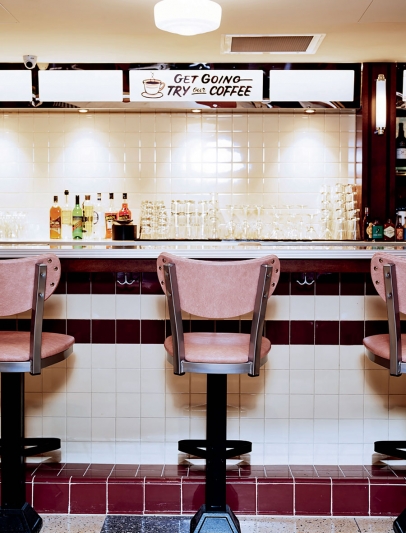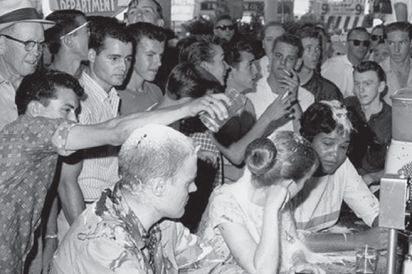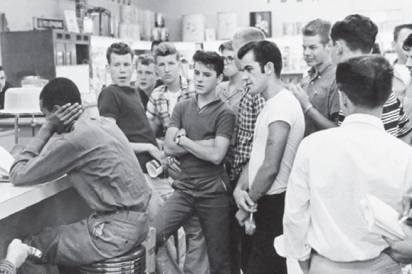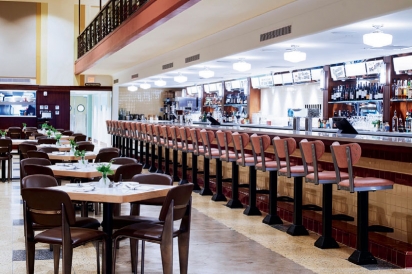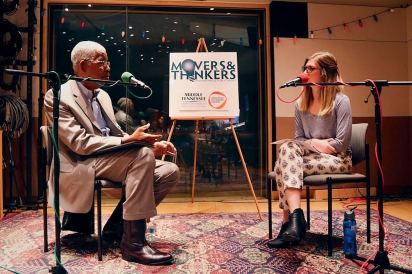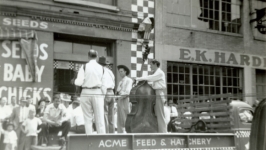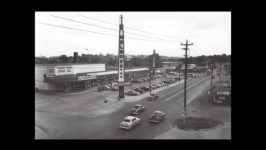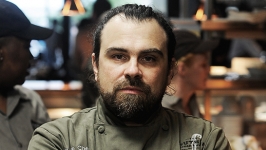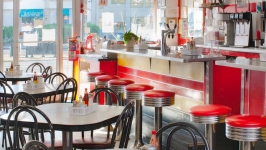Woolworth On 5th: Now Seating Everyone
It’s Tuesday, April 19th, 1960. The Pirates have started the season with a four-and-one record and will go on to beat the Yankees in the World Series. Elvis Presley’s “Stuck on You” is topping the charts. John F. Kennedy has taken the first three Democratic primaries – New Hampshire, Wisconsin, and Illinois – and looks set to win his party’s nomination. It is spring in America.
Then, in Nashville, a bomb goes off. Some twenty sticks of dynamite nearly destroy one home and shatter well over a hundred windows at Meharry Medical across the street. The intended target? Z. Alexander Looby, a Nashville attorney and city councilman. His crime? Representing the sitin demonstrators desegregating Nashville’s lunch counters.
Two months before the attempted murder – Looby and his wife escaped unharmed – 124 college students, overwhelmingly African American, had had enough of America’s Plessy v. Ferguson nonsense, the Jim Crow laws that resulted from the Supreme Court’s 1896 decision, and decided to take a stand by taking a seat. The students occupied several of Nashville’s downtown lunch counters, including the one at Woolworth on 5th. They asked, calmly, to be served, but their dignity was not returned in kind: service was denied, and a more forceful reaction wasn’t long in coming. On February 27th, the day of the fourth sit-in at the Nashville Woolworth, an angry mob dragged their fellow Americans from the lunch counter and forced them out the door amid a storm of kicking, punching, and spitting. It was chaotic and ugly and violent – surely the police would intervene. And they did, arresting the students who had been sitting at the lunch counter. Each was sentenced to a fifty dollar fine and thirty-three days in jail.
The bomb intended for the demonstrators’ lawyer missed Looby, but succeeded in sending Nashville’s segregated lunch counters to history’s dust bin. By happy hour on that April 19th, a crowd of some 4,000 citizens, black and white, had marched on the office of Nashville Mayor Ben West, demanding change. Now. Finding himself suddenly and vastly outnumbered, West heartily agreed: Nashville’s lunch counters would be desegregated.
Fast forward to February of 2018. After many decades in the dark, Woolworth on 5th is refurbished and reopened by restaurateur Tom Morales. But Tom is the first to acknowledge that this project is more than just a restaurant; this one is a responsibility. That is why he took the project on, transforming the old Woolworth into what may soon become the epicenter of Nashville’s nightlife. For all.
“I’m a sucker for history,” Tom says with his distinctive, friendly grin. “The history that happened in this building is important. Those students sat for change and we want to represent that change.”
One way that Woolworth on 5th will do so is with its New Era Ballroom, the beautifully renovated basement, rendered acoustically correct at no small cost to Tom by Nashville’s cadre of sound experts. Wednesday evenings will feature the Big Idea: poetry, spoken word, and other works of art hosted by Nashville actor, playwright, and director Barry Scott. The New Era Ballroom will also be a dancing venue, with house band the Downtown Dippers bringing the sound of swing, soul, and rock-n-roll.
As for the food, Tom and team are exploring the roots of Southern cooking. There are the classics like fried chicken, collard greens, and mac and cheese, but, as Tom says, “there will be lots of twists in things that you won’t find at a meat and three. We will certainly bring to the table a culinary edge on what people call Southern cuisine.” No doubt. My own Tennessee grandmother cooked me lots of dinners, but never served up anything like Tom’s red quinoa with pigeon peas, hominy, wild onions, heirloom tomatoes, greens, and pepitas.
“We are honored to be part of the next chapter of Woolworth on 5th’s history,” Tom says. “It provides a welcome table of home grown flavors, old school sounds, and classic dance moves – and we are excited to share it with the city we love.”
THE DISRUPTER
Rip Patton is a striking figure: tall with graying hair and glasses, and prone to bursting out into song during interviews. In the 1960s, he was one of the college students driving the Civil Rights movement in Nashville. He took part in the sit-ins at downtown lunch counters — like Woolworth's — and stand-ins at the Nashville movie theaters (where he had to enter through the back door), and "freedom rides" to Greyhound bus stops in Alabama and Mississippi, where he was arrested and thrown in prison with his fellow Freedom Riders.
In my interview with Rip, I was struck by how organized the movement was. Marching orders were given; foot soldiers like Rip stuck to them. For example, during the sit-ins, Rip was mostly assigned not to sit but to run: Every time a group of students would get arrested, he would sprint to the nearest telephone booth and alert First Baptist Church, where more students were waiting.
"We knew where all the phones were in the downtown area," he told me. "So as soon as the first group was arrested, the second group would go in … and take those seats."
I talked to Rip in front of a live audience at Nashville Public Radio's studio and produced the interview for our show Movers & Thinkers. We explored his motivation for joining the movement and his role as a "disrupter" — sitting, standing and singing to make major societal change. Listen at podcasts.wpln.org or wherever you get your shows. — By Emily Siner
Woolworth on 5th 221 5th Avenue 615-891-1361 Woolworthonfifth.com


